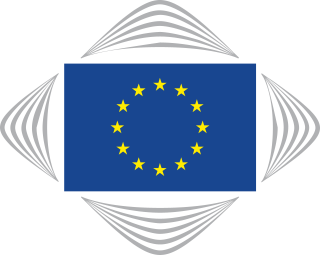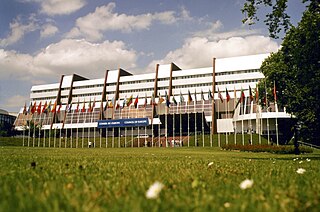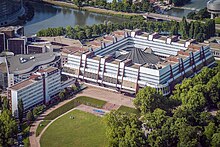
The Council of Europe is an international organisation with the goal of upholding human rights, democracy and the rule of law in Europe. Founded in 1949, it is Europe's oldest intergovernmental organisation, representing 46 member states, with a population of approximately 675 million as of 2023; it operates with an annual budget of approximately 500 million euros.

The European Committee of the Regions (CoR) is the European Union's (EU) assembly of local and regional representatives that provides sub-national authorities with a direct voice within the EU's institutional framework.

The European Economic and Social Committee (EESC) is a consultative body of the European Union (EU) established in 1958. It is an advisory assembly composed of representatives from employers' associations, workers' unions and civil society organisations. Its seat, which it shares with the Committee of the Regions, is the Jacques Delors building on Belliardstraat / Rue Belliard 99 in Brussels.

The Inter-Parliamentary Union is an international organization of national parliaments. Its primary purpose is to promote democratic governance, accountability, and cooperation among its members; other initiatives include advancing gender parity among legislatures, empowering youth participation in politics, and sustainable development.

The European Law Students' Association (ELSA) is an international, independent, non-political, non-profit, non-governmental organisation run by and for law students. ELSA-activities comprise a large variety of academic and professional events that are organised to fulfill the stated vision of ELSA.
The consultative status is a phrase that has been in use since the establishment of the United Nations and is used within the UN community to refer to "Non-governmental organizations (NGOs) in Consultative Status with the United Nations Economic and Social Council". Also some international organizations could grant Consultative Status to NGOs. Organization for Security and Co-operation in Europe (OSCE) could grant Consultative Status in the form of "Researcher-in-residence programme" : accredited representatives of national and international NGOs are granted access to all records and to numerous topical compilations related to OSCE field activities.

The Parliamentary Assembly of the Council of Europe (PACE) is the parliamentary arm of the Council of Europe, a 46-nation international organisation dedicated to upholding human rights, democracy and the rule of law.

The World Federation of United Nations Associations (WFUNA) was founded in 1946 as a Federation of national associations. Its objectives are to promote the values of the UN Charter, defend multilateralism, work towards a better United Nations Organisation and raise awareness on the main pillars of work of the United Nations—peace and security, sustainable development, and human rights.

The United Nations Parliamentary Assembly (UNPA) is a proposed parliamentary body within the United Nations (UN) system.

The Congress of Local and Regional Authorities is the pan-European political assembly representing local and regional authorities from the forty-six member states of the Council of Europe. Its role is to promote local and regional democracy, improve local and regional governance and strengthen authorities' self-government, according to the principles laid down in the European Charter of Local Self-Government. It is made up of two chambers, the Chamber of Local Authorities and the Chamber of Regions and holds its plenary sessions twice a year at the Palace of Europe in Strasbourg, where its permanent Secretariat is located.

The Civic Chamber of the Russian Federation, sometimes shortened to Civic Chamber, is a consultative civil society institution with 168 members created in 2005 in Russia to analyze draft legislation and monitor the activities of the parliament, government, and other government bodies of Russia and its Federal Subjects. It has a role similar to an oversight committee and has consultative powers. A convocation of the chamber is in power for a three-year term.

The Quaker Council for European Affairs (QCEA) is an international not-for-profit organisation which seeks to promote the values and political concerns of the Religious Society of Friends (Quakers) at the European level. It undertakes research and advocacy in the fields of peacebuilding and human rights policy, notably in relation to the European Union and the Council of Europe. Founded in 1979 by Quakers who worked in the European institutions, it is based in Brussels, Belgium, and is registered under Belgian law.

The International Union of Tenants (IUT) is a non-governmental organisation representing 74 tenants' organisations in 51 countries advocating for tenants' rights and defending tenants' interests. IUT's stated aims include safeguarding the interests of tenants and the promotion of affordable healthy housing throughout the world. IUT is a non-party political organisation, working along democratic lines.
The Universal Periodic Review (UPR) is a mechanism of the United Nations (UN) Human Rights Council (HRC) that emerged from the 2005 UN reform process. Commonly referred to as the UPR, it was established by General Assembly resolution 60/251 of 3 April 2006, the UPR periodically examines the human rights performance of all 193 UN Member States. It is intended to complement, not duplicate, the work of other human rights mechanisms, including the UN human rights treaty bodies. This is the first international human rights mechanism to address all countries and all human rights. The Working Group on the UPR, which is composed of the HRC's 47 Member States and chaired by the HRC President, conducts country reviews.

The Parliamentary Assembly of the Mediterranean (PAM) is an international organization established in 2005 by the national parliaments of the countries of the Euro-Mediterranean region. It is the legal successor of the Conference on Security and Cooperation in the Mediterranean (CSCM), launched in the early 1990s.
The United Nations Non-Governmental Liaison Service is a programme of the United Nations mandated to promote and develop constructive relations between the United Nations and civil society organizations. UN-NGLS operates autonomously across the United Nations system and with civil society constituencies and social movements on cross-cutting and emerging issues on the UN agenda. For example, UN-NGLS currently focuses on the UN General Assembly preparatory process for negotiations of a global compact on migration, and high-level events organized by the President of the UN General Assembly. UN-NGLS advises civil society organizations on opportunities to engage with the UN and facilitates their participation in various UN processes and events. UN-NGLS has offices at UN headquarters in New York and is part of the United Nations Department of Global Communications.

The International Federation on Ageing is an international non-governmental organization founded in 1973 and based in Toronto, Ontario, Canada working in the field of ageing, older persons and ageing-related issues such as ageism, The intent of the organisation is for NGOs, the corporate sector, academia, government, and individuals working together to make, according to the IFA’s mission statement, a "change for older people throughout the world by stimulating, collecting, analyzing, and disseminating information on rights, policies and practices that improve the quality of life of people as they age". The IFA has General Consultative Status at the United Nations Economic and Social Council (ECOSOC).

MONEYVAL is the official denomination of the Committee of Experts on the Evaluation of Anti-Money Laundering Measures and the Financing of Terrorism. It is a permanent monitoring body of the Council of Europe, with 35 member states and jurisdictions out of which 32 are assessed exclusively by MONEYVAL.

The European Alliance of Cities and Regions for Roma Inclusion is an initiative from the Congress of Local and Regional Authorities of the Council of Europe. The Alliance currently gathers 130 Cities and Regional authorities from 29 countries.

















